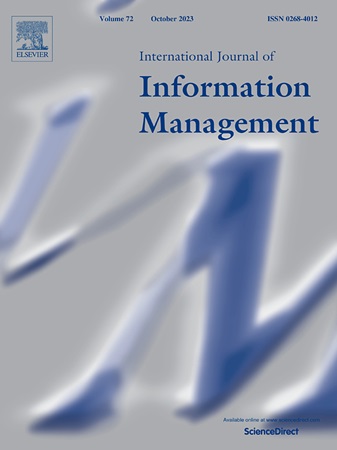东方安逸,西方忧虑?集体主义和对魔法的信仰如何增加用户对操作自主黑箱技术的接受度
IF 27
1区 管理学
Q1 INFORMATION SCIENCE & LIBRARY SCIENCE
International Journal of Information Management
Pub Date : 2025-06-21
DOI:10.1016/j.ijinfomgt.2025.102939
引用次数: 0
摘要
新产品和服务越来越多地要求用户放弃对所谓的“黑箱”技术的控制,在这种技术中,输入和输出之间的联系显得不透明和不可控。尚未有研究调查文化因素是否会调节感知技术可控性对用户接受度的影响。利用计划行为理论和班杜拉的人类代理理论,我们研究了个人主义与集体主义如何影响用户对产品和服务的接受程度,这些产品和服务要求用户将控制权交给人工智能和区块链的操作自主黑匣子技术。我们进一步研究了通过幸运数字和符咒(“对魔法的信仰”)对世界的神奇可控性的信念的影响。通过三个基于调查的实验,采用场景技术,以虚拟产品和服务为特征,总样本量为n = ,美国,印度和加拿大的1750名受访者,我们的研究结果表明,集体主义和对魔法的信仰增加了对操作自主黑匣子技术的接受度。相反,支持西方个人主义文化规范并拒绝世界不可思议的可控性的用户对这种创新表现出高度的怀疑。个人主义-集体主义的调节效应是通过个人主义使用者对可控性的高度需求来中介的。此外,激活魔法思维会放大用户对魔法信仰的影响。我们的研究结果强调了在设计和营销黑盒技术的自主应用时考虑文化因素的重要性。他们还强调需要广泛的社会辩论和未来的研究,以了解技术的可控性在用户接受度中的作用。本文章由计算机程序翻译,如有差异,请以英文原文为准。
Eastern Ease and Western Worries? How collectivism and belief in magic increase user acceptance of operationally autonomous blackbox technologies
New products and services increasingly require users to relinquish control to so-called “Blackbox” technologies, wherein connections between inputs and outputs appear opaque and uncontrollable. No research has yet investigated whether cultural factors moderate the effect of perceived technological controllability on user acceptance. Drawing on the Theory of Planned Behavior and Bandura's Theory of Human Agency, we examine how Individualism versus Collectivism influences the acceptance of products and services that require users to surrender control to the operationally autonomous Blackbox technologies of Artificial Intelligence and Blockchain. We furthermore investigate the impact of belief in the magical controllability of the world through, e.g., lucky numbers and charms (“belief in magic”). Through three survey-based experiments employing Scenario Techniques featuring fictitious products and services with a total sample size of n = 1750 respondents across the US, India, and Canada, our findings reveal that collectivism and belief in magic increase acceptance of operationally autonomous Blackbox technologies. Conversely, users endorsing the Western cultural norm of individualism and rejecting the magical controllability of the world exhibit heightened skepticism toward such innovations. The moderating effect of Individualism-Collectivism is mediated by a heightened Need for Controllability among individualistic users. Moreover, activating magical thinking amplifies the influence of belief in magic among users predisposed toward such beliefs. Our results stress the importance of considering cultural factors when designing and marketing operationally autonomous applications of Blackbox technologies. They also underscore the need for a broad societal debate and future research on the role of perceived controllability of a technology in user acceptance.
求助全文
通过发布文献求助,成功后即可免费获取论文全文。
去求助
来源期刊

International Journal of Information Management
INFORMATION SCIENCE & LIBRARY SCIENCE-
CiteScore
53.10
自引率
6.20%
发文量
111
审稿时长
24 days
期刊介绍:
The International Journal of Information Management (IJIM) is a distinguished, international, and peer-reviewed journal dedicated to providing its readers with top-notch analysis and discussions within the evolving field of information management. Key features of the journal include:
Comprehensive Coverage:
IJIM keeps readers informed with major papers, reports, and reviews.
Topical Relevance:
The journal remains current and relevant through Viewpoint articles and regular features like Research Notes, Case Studies, and a Reviews section, ensuring readers are updated on contemporary issues.
Focus on Quality:
IJIM prioritizes high-quality papers that address contemporary issues in information management.
 求助内容:
求助内容: 应助结果提醒方式:
应助结果提醒方式:


